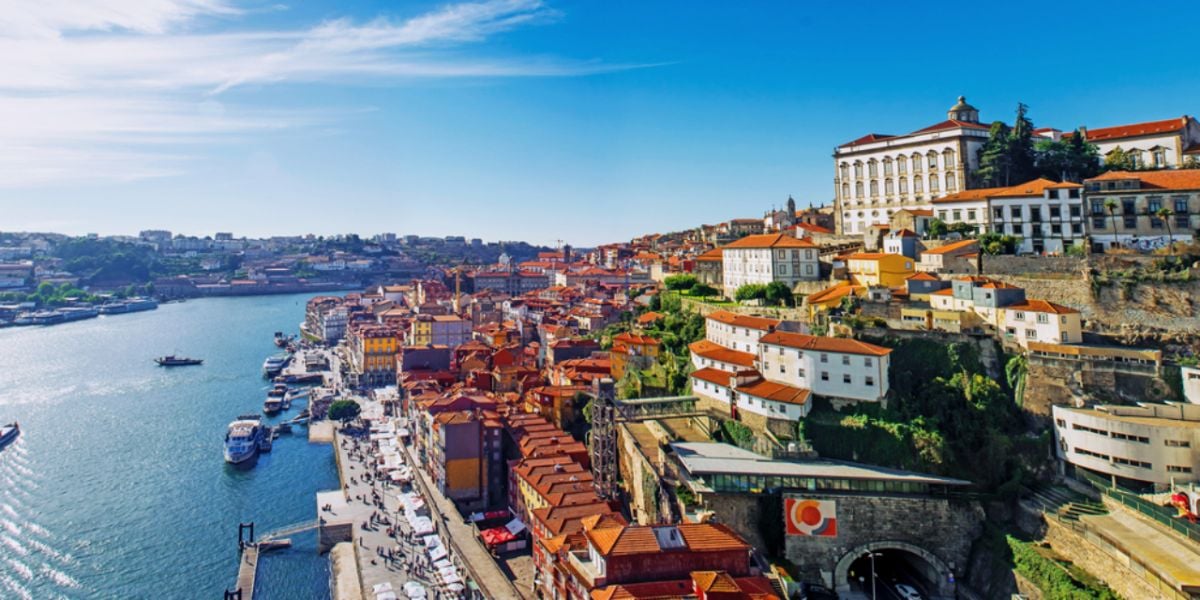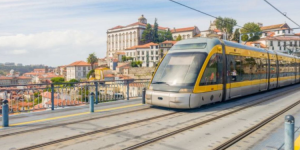
Considered Portugal's second-largest city, Porto is home to over 1.7 million within its wider metropolitan region. Furthermore, with its growing popularity as a tourist destination, apartment hunting in Porto can take some effort. That being said, it's important to know what to expect when renting an apartment, what the current property prices are, and what the best neighborhoods in Porto are, among other important information to help you find your home in Porto.
Because of the rise in popularity as a tourist hotspot, along with a digital nomad visa that attracts plenty of expats from abroad, property prices in the city are rising. Though not yet to the level of Lisbon, finding accommodation in Porto, especially on a short-term basis, can be challenging. To save some money and to have more accommodation options, it is best to venture past the city center.
Should you rent or buy property in Porto?
Whether you decide to rent or buy property in Porto will be guided by lots of different factors, from the length of your stay to your budget. Both options offer specific benefits — as well as challenges. This is why it is absolutely essential to do proper research before making your decision.
Renting accommodation in Porto allows for more flexibility. You will have the option to switch apartments and move to Lisbon or another city, and leaving Portugal will also be much easier with no strings attached. On the other hand, renting options in Porto are rather limited, and prices have been on the rise. In fact, according to the Housing Anywhere International Rent Index, average rent prices for an apartment in the city in the first quarter of 2025 hover at around €1,200 (7.6% drop from 2024). If you prefer a small studio, prepare to pay upwards of €900, while average rentals for a bedroom in a shared apartment will set you back €450/month. This is a tremendous challenge for a city where the average wage stands at around 1,400€/month (before taxes).
On the other hand, buying property in Porto can be a viable option if you are planning a future in the city. While many foreign investors used to buy 500,000€ worth of property in order to get access to the Golden Visa Scheme, allowing them to live legally in the country and apply for citizenship after 5 years, the government has suspended the program for property purchases in Lisbon, Porto and the Algarve. There are still other ways to partake in the Golden Visa Scheme, though, such as creating at least 10 job postings or investing a certain amount in scientific research activities, in the preservation of local heritage sites, or in subscription units of mobile investment funds (non-related to the housing sector). Furthermore, new legislation to tackle speculation and high prices have left city councils to decide on the need to suspend the issuance of new licenses for Airbnbs. As of now, that suspension is in order in both Porto and Lisbon, so you won't be able to rent your property to tourists (legally) if you're away from the city.
Regarding property prices, and though Porto boasts some of the highest in Portugal, they are still relatively tame by Western standards. Be that as it may, and according to the local real estate website Idealista, property prices in Porto have risen 10% since June 2024, currently sitting at 2,926€ per square meter. Naturally, prices are way higher in the city center, where the price per square meter reached a staggering 4,551€ in July 2025 (going up 10% from 2024). Imovirtual states that your average home in Porto is currently listed for 395,000€, 14% more compared to last year.
The process of buying property in Porto is rather straightforward, but can also be complicated if you are not familiar with how things work and do not speak the language. It is, thus, strongly advised to rely on a real estate agency and a legal consultant. Some of the biggest real estate agencies in Porto are Remax, ERA, Century 21 and I movirtual, among others.
Whether you choose to buy or rent accommodation in Porto, it's absolutely essential that you invest a generous amount of time into doing market research. Navigating the real estate market in a foreign country can be an overwhelming process — and it's important to come prepared.
Good to know:
As of now, there is no official data on property prices for different types of housing. However, traditionally, homes are obviously more expensive than apartments and studios. Furthermore, you can check Numbeo for average rent prices in the city center and outside the city center, although the local sources given above are more accurate.
How to find a place to rent in Porto
The best place to start your apartment hunt in Porto is by checking online. Most big rental agencies in the city will post available listings on the internet, and you will have full access to all the properties available in the city. If you are looking for a short-term rental, you can always check Airbnb — but do keep in mind that prices for short-term rentals here can be quite high.
Major rental websites in Porto are Sapo, OLX, Remax and Idealista. If you prefer a house over an apartment (or the other way around) any search engine will allow you to filter for the options you are seeking. If you are already in Porto, you can contact real estate agencies, as they can help you find a property within your budget. However, be prepared to pay their hefty fees. A real estate agent will be especially helpful if you are not fluent in Portuguese. Another place to look is the Marketplace on Facebook, which offers better prices and quicker responses.
Types of accommodation in Porto
Accommodation in Porto will typically come partially furnished and equipped. In the city center, you will find a lot of traditional housing, which may require renovation and not have the most modern amenities. With that, in newer areas, you will find contemporary, newly built apartment blocks. While older homes can have a rustic charm, they are more likely to come with maintenance issues and will probably be extremely cold in the winter (most Portuguese homes are). If you do notice issues like these, make sure to go over them with your landlord and negotiate the needed repairs.
Signing a lease agreement in Porto
To rent a property in Porto, you will need to sign a lease agreement — “contrato de arrendamento” in Portuguese.
Typically, this is a standard rental contract that includes basic information about the tenant and landlord, rent terms and dates, rent amount, and due dates, among other details. The lease also includes a list of items that come included with the property: furniture, appliances, etc. You will then be responsible for leaving the property in the condition that it was rented to you, with allowance for some regular wear and tear, of course.
Note that in order to sign the lease in Porto, you will need to have a Portuguese tax ID number (número de contribuinte). This is a tax identification number, and you can easily get it from your local tax office in Porto. Your landlord may also ask you to provide additional documentation: a credit check, an employment contract, references, and more.
If you want to move out of your rented apartment before the lease expires, you will need to notify your landlord in advance. Typically, you should notify them about your departure about 60 days in advance. Your landlord also has the right to serve you with a notice if they want you to move out before your lease ends. In this case, they may offer you financial compensation or help you find a similar property to relocate to.
At the end of your lease, the landlord will check the property to make sure everything is in place and that there is no major damage. If everything is okay, your deposit (usually 1 month's rent, but some landlords can demand more) will be returned in full. Note that if you do have a deposit disagreement with your landlord, you will need to go through the Civil Court to have it resolved.
When signing the lease, make sure to exercise due diligence:
If the contract is drafted in Portuguese, have it officially translated into English (or another language) to make sure there are no misunderstandings.
If your landlord doesn't speak English and you don't speak Portuguese, consider having an interpreter present when you sign the lease so that you can ask questions and make sure you understand the conditions of the lease.
Before signing the lease, check if your landlord has a legal rental license granted by the local council.
Neighborhoods in Porto
There are several neighborhoods in Porto that are particularly popular among expats. The Downtown District, or Baixa, is Porto's historical and spiritual core. Once a rundown area of the city and an infamous no-go zone after dark during the 90s and early 2000s, it is now a thriving district where bohemian entertainment peeks at every corner.
Baixa – which is composed of the neighborhoods of Cedofeita, Santo Ildefonso, Sé, Miragaia, São Nicolau and Vitória – would be a great option for young professionals looking for an active lifestyle, although rent prices are substantially higher here (expect to pay 1,400€ for a small 70 sq-meter apartment) than anywhere else in the city. Besides, the downtown seems to have been stripped of any essence it once had, having become your run-of-the-mill European city center, riddled with tourist apartments, hotels, international coffee chains and expensive hipster shops. Although it is admittedly pretty and offers lots to do, it's far from the best base if you want to have an authentic experience and mingle with the locals.
Regardless, because of the downtown's former unsavory reputation, the seaside district of Foz do Douro has long been the place where upscale families used to live, standing as one of Porto's poshest areas. Because of its popularity and shortage of rentals, not every tenant can afford to live here. Plus, most places available for rent are tiny 60-square-meter apartments, which go for no less than 1,200€/month.
A little further west, Matosinhos is another seaside neighborhood that has grown into a pretty expensive area. Not as associated with “old money” as Foz do Douro, Matosinhos is the district where the middle and upper-middle class used to move to 20/30 years ago, showcasing a well-developed infrastructure and a lively beachfront, filled with restaurants, bars and all sorts of shops. Plus, the district has a recently expanded cruise ship terminal that welcomes new visitors every day, so it's quite common to see new businesses springing up here and there. Matosinhos is also known as the best place in all of Portugal to eat fish. Sadly, it is also one of the most expensive places to live in the city, with rent prices upwards of 15€ per square meter per month (around 900€ for a 70 sq-meter apartment)
To cap off our section of the wealthiest neighborhoods in Porto, Boavista is the city's unofficial business district, though there are plenty of residential blocks. The neighborhood is very well connected to the rest of the city (with a brand-new metro line expected to open soon) and, much like Foz do Douro, is an area where upscale families are used to buying and investing in property. Nowadays, Boavista has this “fallen-from-grace” aura, as the area is home to an unusually large number of semi-abandoned 1980s and 1990s commercial galleries. Still, it's a very good place to live… if you manage to find a place! As for rent prices, you can expect to spend at least 1,000€/month for a studio or a tiny 1BD apartment.
A little further away from the downtown area, on the opposite side of the Douro River, Vila Nova de Gaia is basically a completely different city composed of dozens of different municipalities. To this day, it stands as one of the country's finest examples of a dormitory town, with most people working in Porto and commuting back after work. Because of that, rent prices have always been lower on this side of the river, although VNG doesn't offer the same excitement as Porto when it comes to infrastructure, bars, restaurants, cafes and things to do. Even so, rent prices are no longer as low as they used to be, with 1BD apartments in Gaia's most popular towns, such as Mafamude, Canidelo or São Pedro da Afurada, available for 800€-1000€.
Finally, it's worth pointing out that the cheapest rent prices in Porto can be found in the suburbs. In places like Valongo, Gondomar or Rio Tinto, you can still find decent apartments for around 700€, though these are getting more and more difficult to find as time goes by. However, there's not much going on in these districts, and aside from certain areas of Gondomar, which are actually served by the metro, having to rely heavily on public transportation to get to the city center will quickly drain your energy.
We do our best to provide accurate and up to date information. However, if you have noticed any inaccuracies in this article, please let us know in the comments section below.








